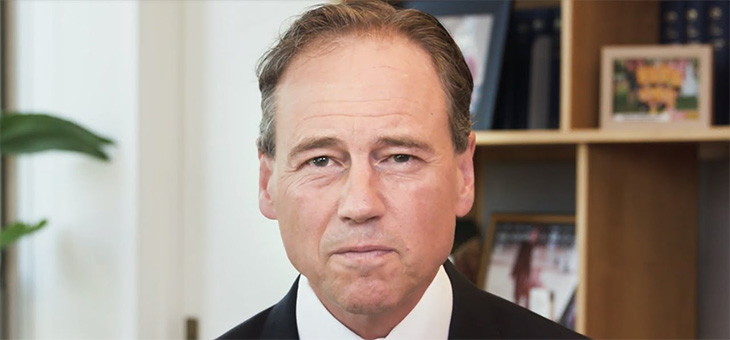If you have been enjoying the ease of telehealth during the COVID-19 crisis, you may not be able to book appointments for much longer.
The government is introducing changes to the telehealth system, which will come into effect from 20 July, that will mean patients will only be able to book a telehealth appointment with their usual GP.
The federal government expanded Medicare-subsidised telehealth and telephone consultation to all Australians earlier this year in response to the COVID-19 pandemic, to slow the virus spreading and ensure access to care for patients.
Last Friday, the government announced it was placing restriction on telehealth consultation with patients only able to consult with their regular GP in this manner, although there are exemptions for infants (under 12 months), the homeless and people in COVID-19 hotspots.
Federal health minister Greg Hunt said the changes would ensure patients continue to receive quality, ongoing care from a GP who knows their medical history and needs.
For the purposes of the changes a relationship between doctor and patient is defined as the patient having seen the same practitioner for a face-to-face service in the last 12 months, or having seen a doctor at the same practice for a face-to-face service during the same period.
The government “will closely monitor the impact of these exemptions and will consider further exemptions as necessary”, Mr Hunt explained.
“Requiring COVID-19 video and telephone services are linked to a patient’s usual GP or practice will support longitudinal, person-centred primary health care, associated with better health outcomes.
“This change … recognises that with restrictions now being lifted in many parts of Australia, it is important for patients to continue seeing their regular doctor.”
The Royal Australian College of General Practitioners (RACGP) welcomed the announcement.
RACGP president Dr Harry Nespolon said the reform was key to ensuring the community continued to receive the highest quality care.
“The evidence shows patients who have an ongoing relationship with their GP report higher levels of satisfaction and better health outcomes – which helps keep patients out of hospitals,” Dr Nespolon said. “Good primary care saves lives and money in the long run.
“GPs and their practices are committed to providing ongoing care to their patients, even if a patient is new to the clinic, there is a commitment to continue to take care of the patient and whatever concerns they have beyond the initial contact.
“I urge all patients to use telehealth or telephone services connected to their usual GP or clinic. If you consult with your usual GP you will receive care informed by your medical history, and they can offer face-to-face consultations when needed.”
Dr Nespolon said the reforms came after the RACGP warned about the rise of corporate telehealth pop-ups, offering low value health services.
“These businesses promise a ‘quick fix’ for patients but there is no commitment to the ongoing care of the patient – the doctors won’t know the patient’s medical history or have a connection to their clinic,” Dr Nespolon said.
“The RACGP advocated strongly for expanded telehealth and telephone consultations to decrease the risk of COVID-19 spreading and make care more accessible for patients.
“But increasing access to care should never come at the cost of patient health and safety, which is why we welcome the government’s reforms.
“The RACGP is strongly in favour of retaining telehealth and telephone consultations beyond the COVID-19 pandemic. We will continue working constructively with the government on this to ensure patients continue to have access to flexible, comprehensive care.
“In the long term, telehealth and telephone consultations will make a real difference for all Australians, particularly for those in rural and remote areas where geography is a barrier, or who have difficulty leaving their home, such as older people or those with disabilities.”
The Consumers Health Forum of Australia (CHF) was also supportive of the changes, but wary about some patients who may fall outside of the scope of the changes.
“In general terms we support the decision by health minister Greg Hunt to limit Medicare payments for telehealth to consultations patients have with their regular doctor or practice,” the health forum’s CEO, Leanne Wells, said.
“This will ensure that people receive ongoing care from a practice that is aware of their clinical history and knows their circumstances.
“We hope this will encourage continuity of care, however we are concerned that, for some, this definition may be too rigid,” Ms Well said. “What happens to those people who have a relationship with a GP or practice, have not had contact in the last 12 months, and now find they need to?
“CHF research shows that most people – particularly families with children, people with chronic conditions and older Australians – prefer to always see the same doctor. However, this ideal is not always possible due to a range of circumstances such as when a patient wishes to change practices, moves home or town or doesn’t have an established relationship with a practice.”
What do you think about the restrictions being placed on telehealth from 20 July?
If you enjoy our content, don’t keep it to yourself. Share our free eNews with your friends and encourage them to sign up.
Related articles:
https://www.yourlifechoices.com.au/health/news/saving-your-eyesight-early
https://www.yourlifechoices.com.au/finance/superannuation/older-aussies-at-risk-of-dud-insurance
https://www.yourlifechoices.com.au/health/news/new-swine-flu-threat

